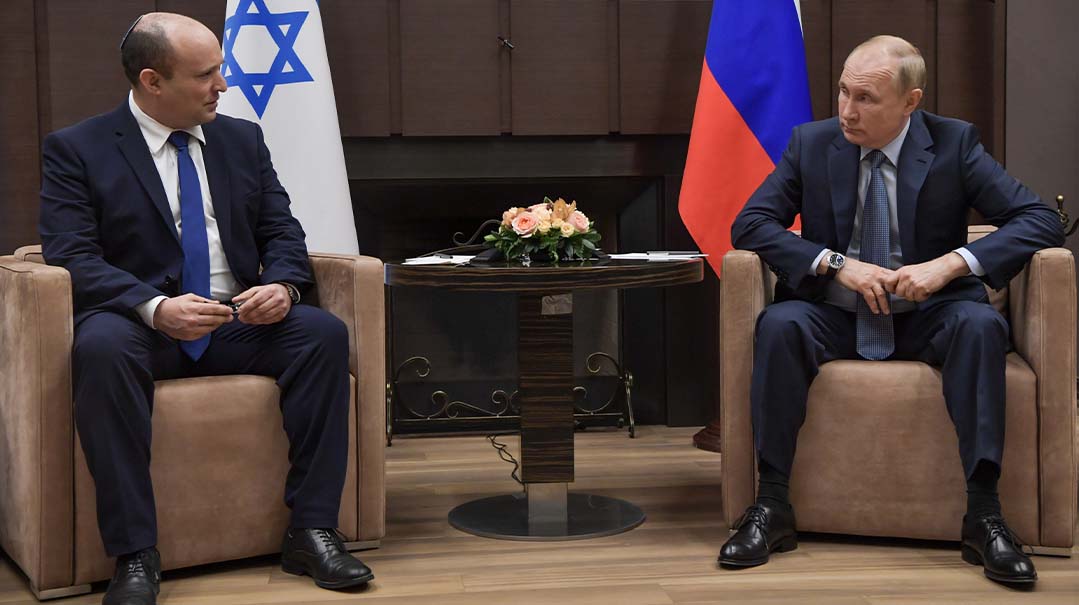What Ukraine’s Plight Means to Israel

Israel is keenly aware of what it means to do all the giving and get nothing in return

Imagine a country with vulnerable boundaries, unprotected by formal military alliances, and engaged in an ongoing conflict with neighboring nations.
That picture accurately describes Ukraine’s dilemma, but Israel shares a similar predicament.
The Israeli government has carefully maintained its neutrality in a conflict between Russia and Ukraine, two nations that both host sizable Jewish populations. Foreign Minister Yair Lapid did issue a tepid condemnation of Russian military action, aimed at appeasing American ears, while Prime Minister Naftali Bennett, who has to deal directly with Vladimir Putin, kept mum. However, Israel is viewing the fate of Ukraine and its Jewish population with great concern, and needs to process the lessons from Russia’s massive attack.
Russia has violated Ukraine’s borders repeatedly in the last decade. In recognizing two pro-Moscow breakaway republics on Ukrainian soil, and launching last week’s invasion, Russia effectively abrogated an international agreement overseen by Europe — the Minsk Protocols. The Organization for Security and Cooperation in Europe (OSCE) has been monitoring compliance with the agreement since it was signed in two stages, in 2014 and 2015, and it has recorded hundreds of Russian violations. Minsk is a model of a flawed agreement that one party felt free to interpret as it wished.
The first lesson to be applied is that international agreements are often not worth the paper they’re written on. Dictators and kleptocrats sign treaties in invisible ink, and it’s also advisable to count your fingers after accepting their handshake.
Russia is far from the only offender. The landscape of history is littered with broken agreements. America broke treaties with native Indian tribes to facilitate its westward expansion, and Nazi Germany’s violation of the Versailles Treaty that ended World War I only set the stage for World War II.
Since World War II, the nature of war has changed, making pacts to end conflicts harder to obtain and enforce. Ever since North Vietnam recruited Viet Cong rebels in South Vietnam to fight their battle for them, rogue nations routinely hide behind proxies and non-state actors to do their evil bidding. Russia also banked on pro-Moscow rebels in the two breakaway Ukraine provinces to man their forward positions. With more wars turning into intra-state and hybrid conflicts, there are too many players with too many interests to pin down to deals.
Is It Real or Functional?
Some political scientists have always been skeptical about the value of international agreements.
In 1998, noted American political science professor Beth Simmons published a scholarly treatise for the Annual Review of Political Science in which she cited two major schools of thought.
The realists, personified by Hans Morgenthau, the 20th-century Jewish German-born political scientist, contend that governments “make legal commitments cynically” and “are always anxious to shake off the restraining influence that international law might have upon their foreign policies.” Professor Simmons also cited French Jewish political philosopher Raymond Aron, who argued forcefully, “International law can merely ratify the fate of arms and the arbitration of force.”
The second school of thought belongs to functionalists, who are subdivided into those who see international legal agreements as meeting a need for states seeking to solve common problems, and those who see treaties as “a collective good” but recognize that no state wants to “contribute disproportionately” or be “disadvantaged consistently.”
In plain English, that means countries are willing to enter into agreements as long as they get more than they give and come out on top more often than not.
Waving a White Flag
Israel is keenly aware of what it means to do all the giving and get nothing in return.
The 1994 Oslo Accords — initiated by Israeli diplomacy but facilitated and strongly supported by the United States — were a blunder of national proportions that has plagued Israel for almost 30 years. The Rabin-Peres government, under the guise of peace, invited a guerrilla group to take up residence in its Biblical heartland, where it proceeded to build a terrorist infrastructure. While the Rabin-Peres government deserves the lion’s share of the blame, the international community capitalized on Israel’s display of weakness and has yet to let up the pressure for more Israeli concessions.
The Israeli government should have learned the lesson from the reign of Palestinian terror that followed Oslo, but they didn’t. At the July 2000 Camp David summit, Ehud Barak seriously considered transferring control of large portions of Jerusalem’s Old City to the Palestinians, including some form of “permanent custodianship” over the Temple Mount. The summit blew up without a deal, but anyone familiar with the Old City and access to the Kosel — and that’s most of us — can appreciate the nightmare it would have been trying to reach our holiest sites under the guard of Palestinians or an international peacekeeping force.
The government could have learned a lesson from that too, but memories are short. During the recent talks to renew the Iran nuclear deal, media reports circulated that Israel briefly considered a proposal by the US and (speak of the devil) Russia to “guarantee” the nuclear agreement, if Israel would only drop its grudging objections.
Israel is not a NATO member, even if it does now fall under the US Central Command (CENTCOM). That’s a military arrangement, not a defense treaty. No other nation would defend Israel from an enemy. In previous Arab-Israeli wars, the US did resupply Israel with weapons, but in recent months, Congress couldn’t overcome its terminal political polarization to replenish Israel’s Iron Dome batteries. So much for Israel being a “consensus” issue between Democrats and Republicans.
Israel’s topography affords far better natural protection than the rolling flatlands of Ukraine, but just as Ukraine has breakaway provinces, Israel also has a bulging “fifth column” of Israeli Arabs and Bedouin who are turning more radical by the day and making life miserable for police and security forces.
Finally, Israel must be aware that opportunists abound. Vladimir Putin has always cast his eyes on Ukraine, but it is fair to assume that he viewed a weak Biden administration as an inducement to pounce now. China may also be eyeing Taiwan with similar bad intent.
Israel still counts the US as its most important and perhaps only ally. But as Ukraine tries to declaw the Russian bear, the Biden administration suffices with sending arms and personnel to the Baltic states. That’s a signal that the US has surrendered Ukraine, and can only hope to decelerate Putin’s march to restore Russia’s sphere of influence in Eastern Europe.
That’s bad news for any country in the world that still views American aid as a foundation for the defense of their nation.
(Originally featured in Mishpacha, Issue 901)
Oops! We could not locate your form.






